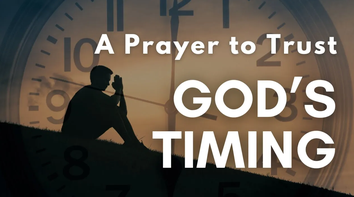An Update on COVID-19 and Learning to Grow amidst Daily Danger
Note from Dr. Jim Denison: I am grateful to my son, Ryan Denison, for writing the Daily Article this week while I am on vacation. Ryan is a graduate of Baylor University and Truett Seminary and is completing his doctoral dissertation in church history at BH Carroll Theological Institute. He serves as Senior Fellow for Theology with our ministry and writes often in my absence. I am certain you will find his insights to be both biblical and practical.
In light of the protests and charged conversations regarding race, it can be easy to forget that we’re still in the midst of a global pandemic. Many fear the mass demonstrations will soon bring the coronavirus back to the forefront of our minds, though. To that end, where do we stand when it comes to COVID-19?
The answer is both encouraging and confusing.
A scientist with the World Health Organization, for example, recently stated that asymptomatic people “rarely transmit” the virus to others. If true, that’s great news, as one of the primary fears with coronavirus is that even healthy-looking people could get others sick.
The WHO clarified yesterday, however, that while asymptomatic people are unlikely to spread the virus, pre-symptomatic people—those who will eventually show symptoms but haven’t yet—can still infect others.
So, essentially, if you aren’t showing symptoms you are unlikely to get anyone else sick unless you will eventually show symptoms, which you can’t know at the time.
Ultimately, they still recommend wearing masks in public and limiting your exposure to large crowds.
COVID-19 may have started in August?
There have also been new developments with regard to when COVID-19 first appeared. A recent study from Harvard Medical School used satellite images of parking lots at six hospitals in Wuhan, China to show that, compared with previous years, there “was a steep increase in occupancies from August 2019, which culminated with a peak in December 2019.” The highest daily occupancies occurred between September and October.
That data, taken in conjunction with an increase in online searches for coronavirus-related symptoms, including those unique to the virus, led the study’s authors to conclude that the virus likely originated earlier than the previously reported date of late December.
Beijing, however, has dismissed the study as “ridiculous” and others have claimed that, while it offers some interesting evidence, it’s far from conclusive.
Acquiring a more precise knowledge of when the virus originated could be an important step toward understanding how it has spread and how we can best fight it. But, in the end, the only thing it seems we can be certain of is that we still can’t be certain.
Some good news amidst troubling times
Despite the mixed messages, it does seem like genuine progress has been made in at least containing the virus. Places like New York City that were once devastated by illness are now hitting their desired benchmarks and, while there are still problem areas around the country, there is more hope now than in months past that we’ll be able to resume some semblance of normalcy in the not too distant future.
That future isn’t here yet, though. And in these uncertain times, it can be easy to become either complacent or discouraged as life seems to spin out of our control.
There’s a basic anxiety that goes along with knowing that simply leaving your house is a dangerous decision. And even if you learn to accept that danger as a necessary part of life, it remains in the back of your mind, producing stress and making everything else just a bit more difficult.
Of course, leaving the house has always been dangerous to some extent. But when that danger seemed within our control, when it came more from random accidents than simply getting coughed on, it didn’t bother us as much. I think the reason is that even when those feelings of control are misplaced, they still imbue us with a sense of protection and security to which many have grown accustomed.
A lesson from the ancient Israelites
If there was ever a people group who knew what it was like to live with the constant reminder that protection and security were not guaranteed, it was the ancient Israelites. Whether it was the decades spent wandering in the wilderness, the enemies that made them feel like “grasshoppers” (Numbers 13:33), or the strange battle plans that made no earthly sense (Joshua 6), the Israelites were forced to approach every day with a very clear understanding of their need for God.
Now, that doesn’t mean they appreciated that fact, as evidenced from the multiple times they complained so much, the Lord told Moses he was ready to destroy them (Exodus 33:5, Numbers 14:11).
Still, God was able to accomplish amazing things through the Hebrew people, and it was in large part because they were forced to depend on him. And the same was true for the first generations of Christians as well (Acts 17:6).
How to grow from daily danger
Most of us are likely anxious for a cure or treatment that will reduce the threat of COVID-19 and allow our lives to resume without masks, public restrictions, and the myriad other daily inconveniences brought on by the virus. Until that day comes, however, let’s allow God to redeem these times by learning to live with a greater dependency on him.
After all, our need for his presence and guidance isn’t going to dissipate when the threat of the coronavirus does. Learning to embrace that need now will better equip us for the days ahead when leaning on God will feel less necessary.
It may seem counterintuitive, but these difficult days might be the easiest time for us to make that choice.
Let’s be sure we don’t waste them.
Publication date: June 10, 2020
Photo courtesy: Anrita1705/Pixabay
Ryan Denison, PhD, is the Senior Editor for Theology at Denison Forum. Ryan writes The Daily Article every Friday and contributes writing and research to many of the ministry’s productions. He holds a PhD in church history from BH Carroll Theological Institute after having earned his MDiv at Truett Seminary. He’s authored The Path to Purpose, What Are My Spiritual Gifts?, How to Bless God by Blessing Others, 7 Deadly Sins, and has contributed writing or research to every Denison Forum book.
The views expressed in this commentary do not necessarily reflect those of CrosswalkHeadlines.
For more from the Denison Forum, please visit www.denisonforum.org.
The Daily Article Podcast is Here!







